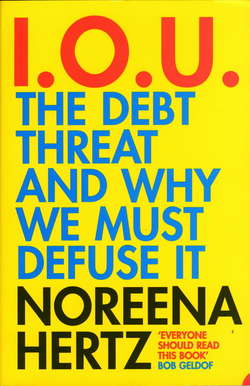Читать книгу IOU: The Debt Threat and Why We Must Defuse It - Noreena Hertz - Страница 8
Debt-endency
Оглавление‘Eat, sleep and shit’ was all Mao Zedong said he did while in Moscow in December 1949, his first ever trip abroad. He should have added ‘and wait’. Because in between crapping, snacking and napping, that was primarily what he did. Ensconced in virtual seclusion in one of Stalin’s dachas, in a birch forest a few miles to the west of Moscow with nothing but biographical films of Stalin to watch, Mao Zedong waited for weeks to be received by the ‘steel man’ whom he had travelled 8,600 km by train to see.
The purpose of his trip was twofold. First to ask Stalin for a $300 million loan on behalf of the newly established People’s Republic of China – Mao had no other source of ‘hard currency’ – the US wouldn’t lend to China, and China’s economy was in difficulty; and second to establish a new Sino-Soviet Treaty of Alliance.
Given that the Soviet Union was itself strapped for cash and in the process of trying to rebuild its own war-torn economy, $300 million was a huge amount for it to lend out. Moreover, Stalin needed time to work out whether an alliance with Communist China was really in the Soviet interest, and more specifically whether Mao, a man he considered a ‘cave Marxist’, someone with no real understanding of socialism, was a necessary ally. Would he be an asset or a liability?
Eventually, Stalin buried his doubts. China was too important to risk losing. A number of countries, including India, had officially recognized the People’s Republic, and Stalin was worried that continued procrastination would risk alienating the Chinese Communists. Stalin also realized that by lending to China, the Soviet Union would be able to bank a favour it could later call in. He agreed to establish the treaty and authorized the loan.
The wisdom of the decision was soon vindicated. Only a few months later the Korean War erupted, and within weeks of the American landing at Inchon, the Russian-backed North Korean army was on the verge of annihilation. An anxious Stalin requested Chinese intervention and Mao, partly prompted by his desire to prove that Soviet support of China had been justified, obliged. Ironically, and much to Mao’s irritation, almost all of the $300 million Soviet loan ended up being used to buy Soviet weapons to fight a prolonged war in Korea on Stalin’s behalf.
Four years later the question of debt reared its head once more in Sino-Soviet relations. In 1954, Stalin’s successor Nikita Khrushchev, in a show of ‘fraternal’ support, offered another $500 million to Mao Zedong – at a very low interest rate of only 2 per cent. The loan was meant to be paid back between 1966 and 1967, but this time China returned the debt ahead of schedule, much to Khrushchev’s surprise. As he told the Central Committee Plenum in February 1964, the Chinese could have reaped great financial rewards on such a low-interest loan. In fact, the Soviets had made this clear to Beijing. But Mao insisted on repayments. ‘Can any of the economists understand this?’ Khrushchev asked. ‘It is difficult to understand. Only Mao Zedong can understand this.’
Mao had insisted on repaying the Soviets so quickly because he understood all too clearly that the cost of debt cannot only be measured in financial terms. He saw that loans from other governments often also come at a huge political cost: binding countries to each other, and creating a dependency that first establishes and then serves to reinforce pre-existing power asymmetries and he didn’t want to risk being so dependent on the Soviet Union that he lost political manoeuvrability and endangered his own sovereignty. This was a similar conclusion to that reached by Simon Bolivar, the liberator of the Andean Spanish Colonies (a rough amalgam of Venezuela, Colombia and Ecuador as they are today) over a hundred years before. ‘I despise debt more than I do the Spanish!’ Bolivar had said to his comrades-in-arms, explaining that, ‘it threatens the independence that had cost so much in blood.’ And one echoed much more recently by the Indian government in 2002, when it paid off its most expensive multilateral loans (loans to the IMF, World Bank and regional development banks) early, and again in 2003 when Prime Minister Atal Behari Vajpayee announced to 22 donor countries that he did not want to receive their aid on a government-to-government basis any more as India was no longer willing to accept the conditions that came with it. Echoed again by Thaksin Shinawatra, Prime Minister of Thailand in 2003 when he repaid the $12 billion loan his country had secured from the IMF in the wake of the Asian financial crisis, a year before it was due. Against a backdrop of a massive national flag and with patriotic theme songs blaring, he swore to his audience that this was ‘the last time the country would be indebted to the IMF’, while reminding them of what a ‘pain to the nation’ the debt had been.
But the responses of Mao, Bolivar, and Vajpayee and Shinawatra are not typical. Most developing countries have not and do not take a stance against borrowing. Instead developing world leaders have on the whole accepted indeed in many cases embraced loans from whichever government has proffered them. The reasons we will come back to later on.
